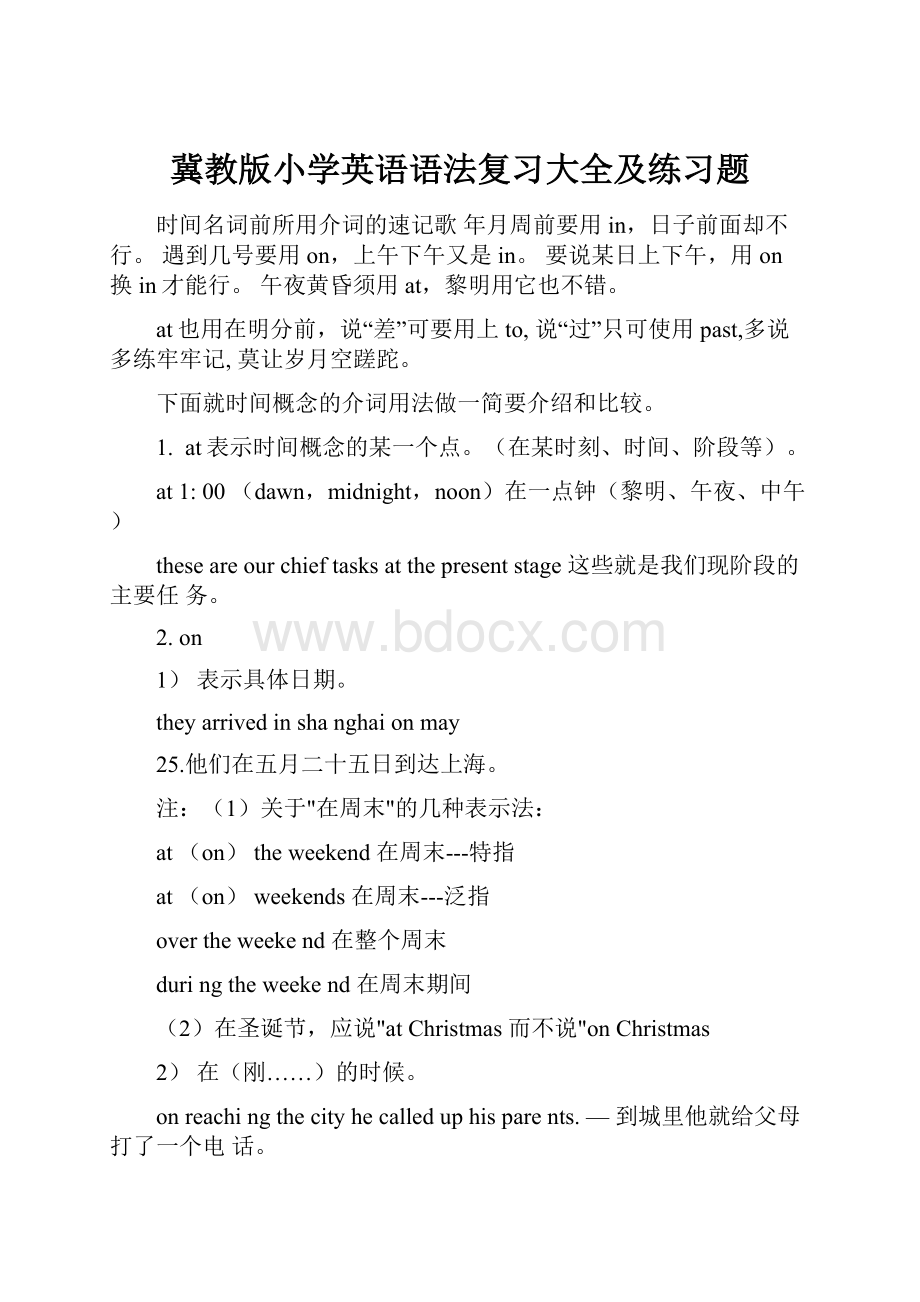冀教版小学英语语法复习大全及练习题.docx
《冀教版小学英语语法复习大全及练习题.docx》由会员分享,可在线阅读,更多相关《冀教版小学英语语法复习大全及练习题.docx(17页珍藏版)》请在冰豆网上搜索。

冀教版小学英语语法复习大全及练习题
时间名词前所用介词的速记歌年月周前要用in,日子前面却不行。
遇到几号要用on,上午下午又是in。
要说某日上下午,用on换in才能行。
午夜黄昏须用at,黎明用它也不错。
at也用在明分前,说“差”可要用上to,说“过”只可使用past,多说多练牢牢记,莫让岁月空蹉跎。
下面就时间概念的介词用法做一简要介绍和比较。
1.at表示时间概念的某一个点。
(在某时刻、时间、阶段等)。
at1:
00(dawn,midnight,noon)在一点钟(黎明、午夜、中午)
theseareourchieftasksatthepresentstage这些就是我们现阶段的主要任务。
2.on
1)表示具体日期。
theyarrivedinshanghaionmay
25.他们在五月二十五日到达上海。
注:
(1)关于"在周末"的几种表示法:
at(on)theweekend在周末---特指
at(on)weekends在周末---泛指
overtheweekend在整个周末
duringtheweekend在周末期间
(2)在圣诞节,应说"atChristmas而不说"onChristmas
2)在(刚……)的时候。
onreachingthecityhecalleduphisparents.—到城里他就给父母打了一个电话。
3.in
1)表示"时段"、"时期",在多数情况下可以和dur-ing互换,前者强调对比,后者强调持续。
in(during)1988(december,the20thcentury)在一九八八年
(十二月、二十世纪)
ireturnedtobeijinginthemiddleofjune.我是六月中回北京的。
但如果表
示"在某项活动的期间",贝U只能用during。
duringmymilitaryservice(thetrip)在我服役期间(在旅行期间)
2)表示以说话时间为基点的"(若干时间)以后",常用作将来时态谓语的时间状语。
如这时要表示"(若干时间)内",常用within。
比较:
themeetingwillendin30minutes.(三十分钟后)会议三十分钟后结束。
canyoufinishitwithin30minutes?
(三十分钟内)你能在三十分钟之内
完成这件事吗?
但在过去时态中,in可用于表"在若干时间以内",这时不要误用during。
thejobwasdoneduringaweek(wrong)
thejobwasdoneinaweek(right)这工作在一星期内就完成了。
4.after表示"在(某具体时间)以后",注意不要和in的2)意混淆。
aftersupper(8o'clock,thewar)晚饭(八点、战)后比较:
hewillbe
backintwohours.他将在两个小时以后回来。
hereturnedtohishometownafterthewar.战后他回至U了故乡。
5.for表示"(动作延续)若干时间",有时可省略。
istayedinlondon(for)twodaysonmywaytonewyork.在去纽约的途中,我在伦敦呆了两天。
6.since表示"自(某具体时间)以来",常用作完成时态谓语的时间状语。
sineeliberation(1980)自从解放(1980年)以来theyhavebeenclosefriendssincechildhood.他们从小就是好朋友。
注:
(1)sincethewar是指"自从战争结束以来",若指"自从战争开始以来",须说"sineethebeginningofthewar。
(2)不要将sinee与after混淆。
比较:
hehasworkedheresinee1965(指一段时间,强调时间段)自从1965年以来,他一直在这儿工作。
hebegantoworkhereafter1965(指一点时间,强调时间点)从1965年以后,他开始在这儿工作。
7.by表示"到的时候",其谓语时态的用法:
动作动词常用完成时态;状态动词(be)常用一般时态。
比较:
bynoon,everybodyhad(willhave)arrivedthere,bynoon,everybodywere
(willbe)there.到中午的时候,大家都(将)到那儿了。
以上探讨了介词表
示时间概念时的用法和比较,上述介词除表示时间概念外还有其他的用法,英语学习者必须掌握其各种用法,才能灵活运用,提高自己的语言能力。
小学英语语法复习要点
(一)一、名词复数规则
1.一般情况下,直接力卩-s,如:
book-books,bag-bags,cat-cats,bed-beds
2.以s.x.sh.ch结尾,力卩-es,如:
bus-buses,box-boxes,brush-brushes,watch-watches
3.以“辅音字母+y”结尾,变y为i,再加-es,如:
family-families,strawberry-strawberries
4.以“f或fe”结尾,变f或fe为v,再加-es,如:
knife-knives
5.不规则名词复数:
man-men,woman-women,policeman-policemen,policewoman-policewomen,mouse-mice
child-children
foot-feet,.tooth-teeth
fish-fish,people-people,Chinese-Chinese,Japanese-Japanese
写出下列各词的复数
I
him
this
her
watch
child
photo
diary
day
foot
book
dress
tooth
sheep
box
strawberry
thief
yo-yo
peach
sandwich
man
woman
paper
juice
watermilkricetea
二、一般现在时
一般现在时基本用法介绍
【No.1】一般现在时的功能
1.表示事物或人物的特征、状态。
如:
Theskyisblue天空是蓝色的。
2.表示经常性或习惯性的动作。
女口:
Igetupatsixeveryday我每天六点起床。
3.表示客观现实。
如:
Theearthgoesaroundthesu地球绕着太阳转。
一般现在时的构成
1.be动词:
主语+be(am,is,are)+其它。
如:
Iamaboy我是一个男孩。
2.行为动词:
主语+行为动词(+其它)。
如:
WestudyEnglish我们学习英语。
当主语为第三人称单数(he,she,it时,要在动词后加"-s"或"-es"。
女口:
MarylikesChinese玛丽喜欢汉语。
一般现在时的变化
1.be动词的变化。
否定句:
主语+be+not+其它。
女口:
Heisnotaworker他不是工人。
一般疑问句:
Be+主语+其它。
如:
-Areyouastudent?
-Yes.Iam./No,I'mnot.
特殊疑问句:
疑问词+一般疑问句。
如:
Whereismybike?
2.行为动词的变化。
否定句:
主语+don't(doesn't)+动词原形(+其它)。
如:
Idon'tlikebread.
当主语为第三人称单数时,要用doesn't构成否定句。
如:
Hedoesn'toftenplay.
一般疑问句:
Do(Does)+主语+动词原形+其它。
如:
-Doyouoftenplayfootball?
-Yes,Ido./No,Idon't.
当主语为第三人称单数时,要用does构成一般疑问句。
如:
-Doesshegotoworkbybike?
-Yes,shedoes./No,shedoesn't.
特殊疑问句:
疑问词+一般疑问句。
如:
Howdoesyourfathergotowork?
动词+s的变化规则
1.一般情况下,直接加-s,如:
cook-cooks,milk-milks
2.以s.x.sh.ch.o结尾,力卩-es,如:
guess-guesses,wash-washes,watch-watches,go-goes
3.以“辅音字母+y”结尾,变y为i,再加-es,如:
study-studies一般现在时用法专练:
一、写出下列动词的第三人称单数
drinkgostaymake
lookhavepasscarry
comewatchplantfly
studybrushdoteach
二、用括号内动词的适当形式填空。
1.Heoften(have)dinnerathome.
2.DanielandTommy(be)inClassOne.
3.We(notwatch)TVonMonday.
4.Nick(notgo)tothezooonSunday.
5.they(like)theWorldCup?
6.Whattheyoften(do)onSaturdays?
7.yourparents(read)newspaperseveryday?
8.Thegirl(teach)usEnglishonSundays.
9.SheandI(take)awalktogethereveryevening.
10.There(be)somewaterinthebottle.
11.Mike(like)cooking.
12.They(have)thesamehobby.
13.Myaunt(look)afterherbabycarefully.
14.Youalways(do)yourhomeworkwell.
15.I(be)ill.I'mstayinginbed.
16.She(go)toschoolfromMondaytoFriday.
17.LiuTao(do)notlikePE.
18.Thechildoften(watch)TVintheevening.
19.SuHaiandSuYang(have)eightlessonsthisterm.
20.-Whatday(be)ittoday?
-It'sSaturday.
三、按照要求改写句子
1.DanielwatchesTVeveryevening.改为否定句)
2.1domyhomeworkeveryday.改为一般疑问句,作否定回答)
3.Shelikesmilk.(改为一般疑问句,作肯定回答)
4.Amylikesplayingcomputergames.改为一般疑问句,作否定回答)
5.Wegotoschooleverymorning.改为否定句)
6.HespeaksEnglishverywell.改为否定句)
7.Iliketakingphotosinthepark.对划线部分提问)
8.JohncomesfromCanada对划线部分提问)
9.Sheisalwaysagoodstudent改为一般疑问句,作否定回答)
10.SimonandDaniellikegoingskating.改为否定句)
五、改错(划出错误的地方,将正确的写在横线上)
1.IsyourbrotherspeakEnglish?
2.Doeshelikesgoingfishing?
3.Helikesplaygamesafterclass.
4.Mr.WuteachsusEnglish.
5.Shedon'tdoherhomeworkonSundays.
三、现在进行时
1.现在进行时表示现在正在进行或发生的动作,也可表示当前一段时间内的活动或现阶段正在进行的动作。
2.现在进行时的肯定句基本结构为be+动词ing.
3.现在进行时的否定句在be后加not。
4.现在进行时的一般疑问句把be动词调到句首。
5.现在进行时的特殊疑问的基本结构为:
疑问词不达意+be+主语+动词ing?
但疑问词当主语时其结构为:
疑问词不达意+be+动词ing?
动词加ing的变化规则
1.一般情况下,直接加ing,如:
cook-cooking
2.以不发音的e结尾,去e力卩ing,如:
make-making,taste-tasting
3.
ing,
如果末尾是一个元音字母和一个辅音字母,双写末尾的辅音字母,再加
如:
run-running,stop-stopping
现在进行时专项练习:
一、写出下列动词的现在分词:
make_
play
run
swim___
go__
like
write
ski
read
have
_sing__
dance_
put_
seeb
uy
___love
livetakecomeget
stopsitbeginshop
二、用所给的动词的正确形式填空:
1.Theboy(draw)apicturenow.
2.Listen.Somegirls(sing)intheclassroom.
3.Mymother(cook)somenicefoodnow.
4.Whatyou(do)now?
5.Look.They(have)anEnglishlesson.
6.They(not,water)theflowersnow.
7.Look!
thegirls(dance)intheclassroom.
8.Whatisourgranddaughterdoing?
She(listen)tomusic.
9.It's5o'clocknow.We(have)suppernow
10.Helen(wash)clothes?
Yes,sheis.
三、句型转换:
1.Theyaredoinghousework.分(别改成一般疑问句和否定句)2.Thestudentsarecleaningtheclassroom.改(一般疑问句并作肯定和否定回答)3.I'mplayingthefootballintheplayground.(对划线部分进行提问)4.Tomisreadingbooksinhisstudy.对(划线部分进行提问)
四、将来时理论及练习
一、概念:
表示将要发生的动作或存在的状态及打算、计划或准备做某事。
句中一般有以下时间状语:
tomorrow,nextday(week,month,yea「・),soon,thedayafter
tomorrow(后天)等。
二、基本结构:
①begoingto+dq
②will+do.
三、否定句:
在be动词(am,is,arel后加not或情态动词will后加not成won't。
例如:
I'mgoingtohaveapicnicthisafternoon「I'mnotgoingtohaveapicnicthisafternoon.
四、一般疑问句:
be或will提到句首,some改为any,and改为or,第一二人称互换。
例如:
Wearegoingtogoonanoutingthisweekend.—Areyougoingtogoonanoutingthisweekend?
五、对划线部分提问。
一般情况,一般将来时的对划线部分有三种情况。
1.问人。
Who例如:
I'mgoingtoNewYorksoon.—Who'sgoingtoNewYorksoon.
2.问干什么。
What…do.例如:
Myfatherisgoingtowatcharacewithmethisafternoon.—Whatisyourfathergoingtodowithyouthisafternoon.
3.问什么时候。
When.例如:
She'sgoingtogotobedatnine.—Whenisshegoingtobed?
六、同义句:
begoingto=will
Iamgoingtogoswimmingtomorrow(明天).=Iwillgoswimmingtomorrow.填空。
1.我打算明天和朋友去野炊。
Ihaveapicnicwithmyfriends.
Ihaveapicnicwithmyfriends.
2.下个星期一你打算去干嘛?
我想去打篮球。
WhatnextMonday?
Iplaybasketball.
WhatyoudonextMonday?
Iplaybasketball.
3.你妈妈这个周末去购物吗?
是,她要去买一些水果。
yourmothergoshoppingthis?
Yes,she.Shebuysomefruit.
4.你们打算什么时候见面。
Whattimeyoumeet?
改句子。
5.Nancyisgoingtogocamping.(改否定)
Nancygoingtogocamping.
6.I'llgoandjointhem.(改否定)
Igojointhem.
7.I'mgoingtogetupat6:
30tomorrow.(改一般疑问句)
togetupat6:
30tomorrow?
8.Wewillmeetatthebusstopat10:
30(.改一般疑问句)
meetatthebusstopat10:
30.
9.Sheisgoingtolistentomusicafterschool(.对划线部分提问)
sheafterschool?
10.Myfatherandmotheraregoingtoseeaplaythedayaftertomorrow同上)
goingtoseeaplaythedayaftertomorrow.用所给词的适当形式填空。
11.Todayisasunnyday.We(have)apicnicthisafternoon.
12.Mybrother(go)toShanghainextweek.
13.Tomoften(go)toschoolonfoot.Buttodayisrain.He
(go)toschoolbybike.
14.Whatdoyouusuallydoatweekends?
Iusually(watch)TVand
(catch)insects?
15.It'sFridaytoday.Whatshe(do)thisweekend?
She
(watch)TVand(catch)insects.
16.What(d0)youdolastSunday?
I(pick)applesona
farm.What(do)nextSunday?
I(milk)cows.
17.Mary(visit)hergrandparentstomorrow.
18.LiuTao(fly)kitesintheplaygroundyesterday.
19.David(give)apuppetshownextMonday.
20.I(plan)formystudynow.
五、一般过去时
1.一般过去时表示过去某个时间发生的动作或存在的状态,常和表示过去的时间状语连用。
一般过去时也表示过去经常或反复发生的动作感谢。
2.Be动词在一般过去时中的变化:
⑴am和is在一般过去时中变为was。
(wasnot=wasnt)
⑵are在一般过去时中变为wereo(werenot=weren't)
⑶带有was或were的句子,其否定、疑问的变化和is,am,are一样,即否定句在was或were后加not,—般疑问句把was或were调到句首。
3•句中没有be动词的一般过去时的句子
否定句:
didn't+动词原形,如:
Jimdidn'tgohomeyesterday.
一般疑问句:
在句首加did,句子中的动词过去式变回原形。
如:
DidJimgohomeyesterday?
特殊疑问句:
⑴疑问词+did+主语+动词原形?
如:
WhatdidJimdoyesterday?
⑵疑问词当主语时:
疑问词+动词过去式?
如:
Whowenttohomeyesterday?
动词过去式变化规则:
1.一般在动词末尾加-ed,如:
pull-pulled,cook-cooked
2.结尾是e加d,如:
taste-tasted
3.末尾只有一个元音字母和一个辅音字母的重读闭音节,应双写末尾的辅音字母,再力卩-ed,如:
stop-stopped
4.以“辅音字母+y”结尾的,变y为i,再加-ed,如:
study-studied过去时练习